Global Sustainable Tourism: Adverse Impacts and Strategies Report
VerifiedAdded on 2023/01/12
|9
|2550
|28
Report
AI Summary
This report delves into the realm of sustainable tourism, examining the adverse impacts of the tourism industry and the subsequent need for sustainable development. It analyzes the evolution of sustainable tourism concepts and the essential principles underlying effective strategies. The report evaluates the roles of key stakeholders, including national and local governments, local communities, and tourism enterprises, in shaping the global sustainable tourism agenda and driving strategic development. Furthermore, it assesses how these stakeholders contribute to the development and implementation of these strategies. The report uses the TUI Group as a case study to demonstrate how sustainable tourism strategies are implemented. Finally, the report provides a comprehensive overview of sustainable tourism, from its environmental impact to its strategic importance.
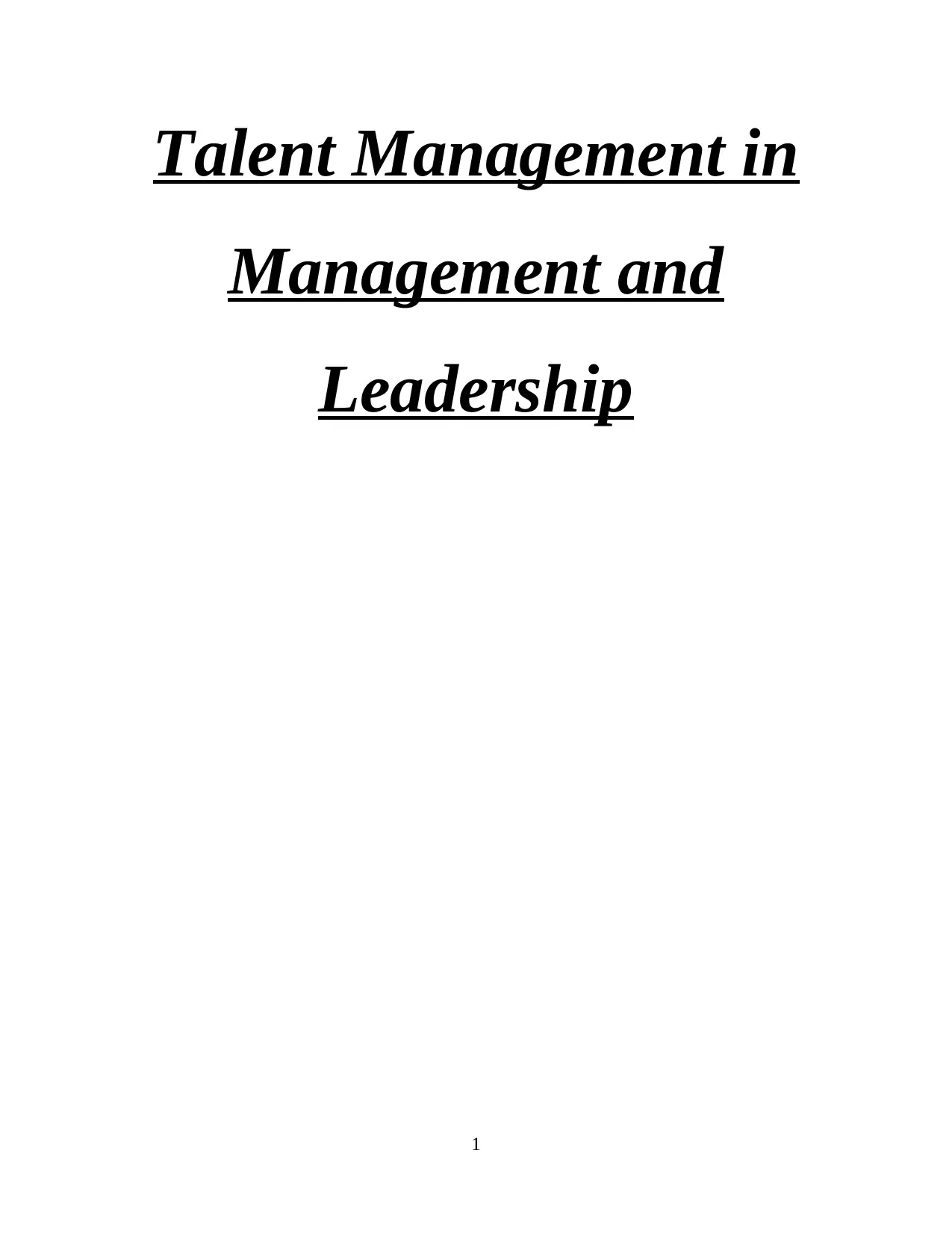
Talent Management in
Management and
Leadership
1
Management and
Leadership
1
Paraphrase This Document
Need a fresh take? Get an instant paraphrase of this document with our AI Paraphraser
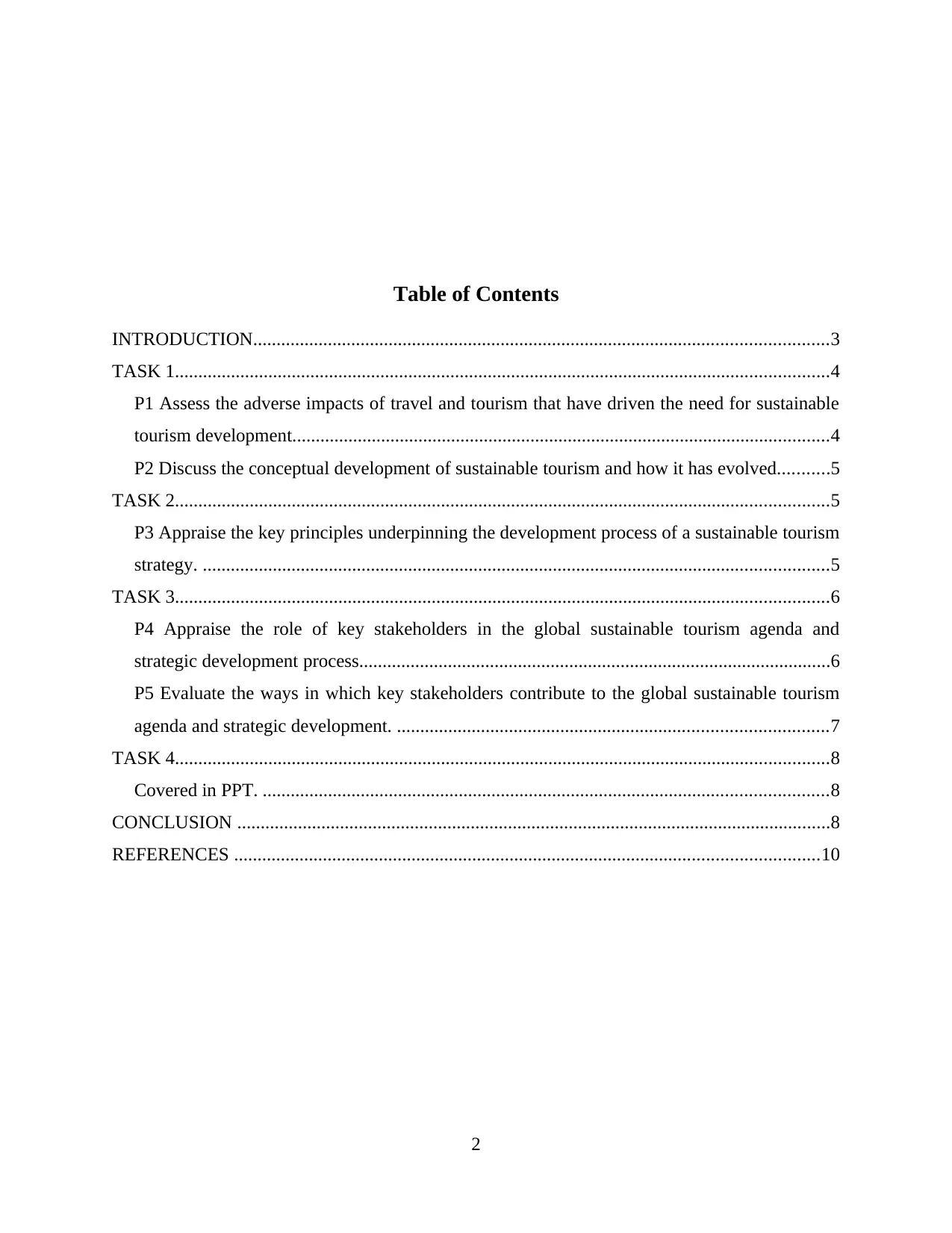
Table of Contents
INTRODUCTION...........................................................................................................................3
TASK 1............................................................................................................................................4
P1 Assess the adverse impacts of travel and tourism that have driven the need for sustainable
tourism development...................................................................................................................4
P2 Discuss the conceptual development of sustainable tourism and how it has evolved...........5
TASK 2............................................................................................................................................5
P3 Appraise the key principles underpinning the development process of a sustainable tourism
strategy. ......................................................................................................................................5
TASK 3............................................................................................................................................6
P4 Appraise the role of key stakeholders in the global sustainable tourism agenda and
strategic development process.....................................................................................................6
P5 Evaluate the ways in which key stakeholders contribute to the global sustainable tourism
agenda and strategic development. ............................................................................................7
TASK 4............................................................................................................................................8
Covered in PPT. .........................................................................................................................8
CONCLUSION ...............................................................................................................................8
REFERENCES .............................................................................................................................10
2
INTRODUCTION...........................................................................................................................3
TASK 1............................................................................................................................................4
P1 Assess the adverse impacts of travel and tourism that have driven the need for sustainable
tourism development...................................................................................................................4
P2 Discuss the conceptual development of sustainable tourism and how it has evolved...........5
TASK 2............................................................................................................................................5
P3 Appraise the key principles underpinning the development process of a sustainable tourism
strategy. ......................................................................................................................................5
TASK 3............................................................................................................................................6
P4 Appraise the role of key stakeholders in the global sustainable tourism agenda and
strategic development process.....................................................................................................6
P5 Evaluate the ways in which key stakeholders contribute to the global sustainable tourism
agenda and strategic development. ............................................................................................7
TASK 4............................................................................................................................................8
Covered in PPT. .........................................................................................................................8
CONCLUSION ...............................................................................................................................8
REFERENCES .............................................................................................................................10
2
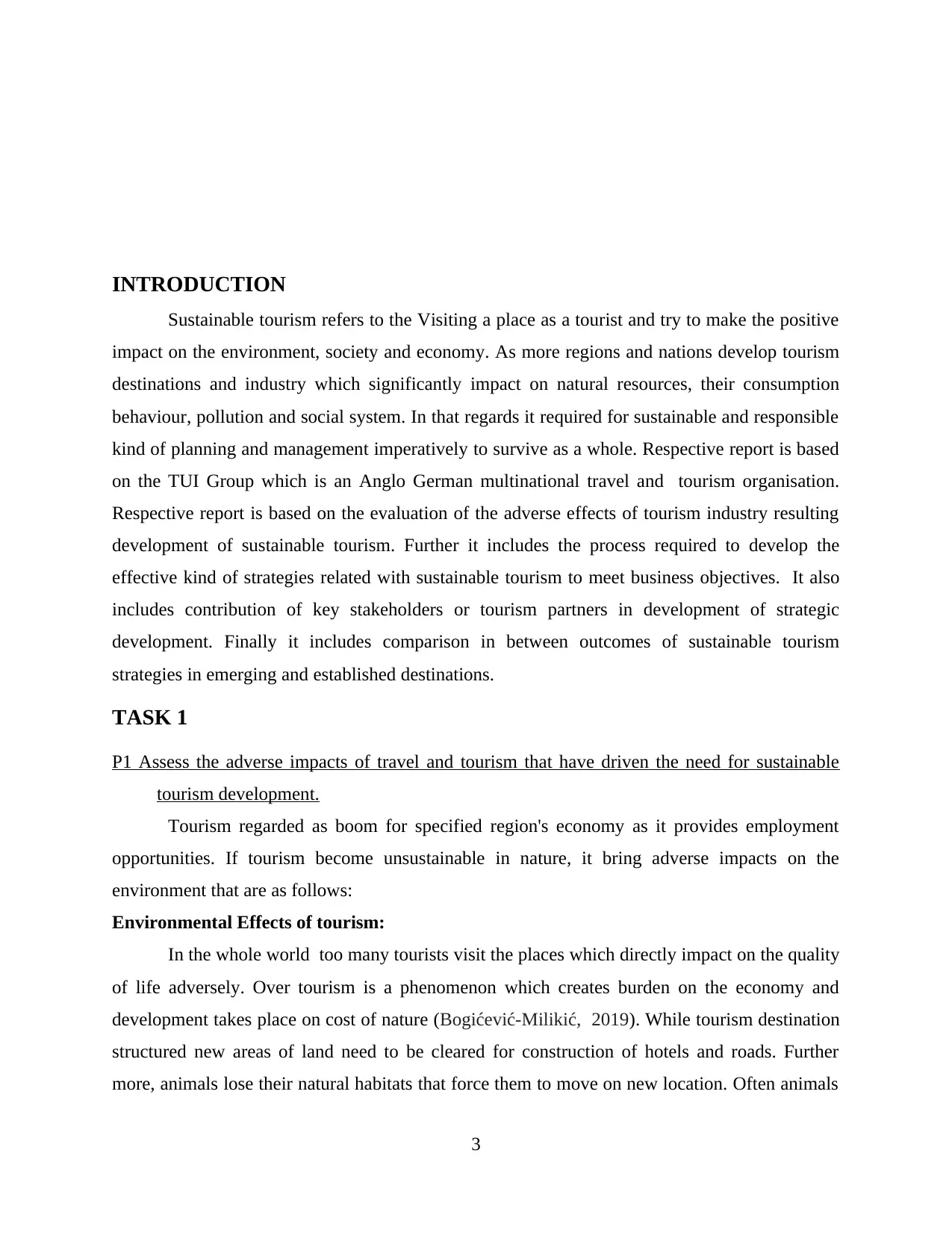
INTRODUCTION
Sustainable tourism refers to the Visiting a place as a tourist and try to make the positive
impact on the environment, society and economy. As more regions and nations develop tourism
destinations and industry which significantly impact on natural resources, their consumption
behaviour, pollution and social system. In that regards it required for sustainable and responsible
kind of planning and management imperatively to survive as a whole. Respective report is based
on the TUI Group which is an Anglo German multinational travel and tourism organisation.
Respective report is based on the evaluation of the adverse effects of tourism industry resulting
development of sustainable tourism. Further it includes the process required to develop the
effective kind of strategies related with sustainable tourism to meet business objectives. It also
includes contribution of key stakeholders or tourism partners in development of strategic
development. Finally it includes comparison in between outcomes of sustainable tourism
strategies in emerging and established destinations.
TASK 1
P1 Assess the adverse impacts of travel and tourism that have driven the need for sustainable
tourism development.
Tourism regarded as boom for specified region's economy as it provides employment
opportunities. If tourism become unsustainable in nature, it bring adverse impacts on the
environment that are as follows:
Environmental Effects of tourism:
In the whole world too many tourists visit the places which directly impact on the quality
of life adversely. Over tourism is a phenomenon which creates burden on the economy and
development takes place on cost of nature (Bogićević-Milikić, 2019). While tourism destination
structured new areas of land need to be cleared for construction of hotels and roads. Further
more, animals lose their natural habitats that force them to move on new location. Often animals
3
Sustainable tourism refers to the Visiting a place as a tourist and try to make the positive
impact on the environment, society and economy. As more regions and nations develop tourism
destinations and industry which significantly impact on natural resources, their consumption
behaviour, pollution and social system. In that regards it required for sustainable and responsible
kind of planning and management imperatively to survive as a whole. Respective report is based
on the TUI Group which is an Anglo German multinational travel and tourism organisation.
Respective report is based on the evaluation of the adverse effects of tourism industry resulting
development of sustainable tourism. Further it includes the process required to develop the
effective kind of strategies related with sustainable tourism to meet business objectives. It also
includes contribution of key stakeholders or tourism partners in development of strategic
development. Finally it includes comparison in between outcomes of sustainable tourism
strategies in emerging and established destinations.
TASK 1
P1 Assess the adverse impacts of travel and tourism that have driven the need for sustainable
tourism development.
Tourism regarded as boom for specified region's economy as it provides employment
opportunities. If tourism become unsustainable in nature, it bring adverse impacts on the
environment that are as follows:
Environmental Effects of tourism:
In the whole world too many tourists visit the places which directly impact on the quality
of life adversely. Over tourism is a phenomenon which creates burden on the economy and
development takes place on cost of nature (Bogićević-Milikić, 2019). While tourism destination
structured new areas of land need to be cleared for construction of hotels and roads. Further
more, animals lose their natural habitats that force them to move on new location. Often animals
3
⊘ This is a preview!⊘
Do you want full access?
Subscribe today to unlock all pages.

Trusted by 1+ million students worldwide
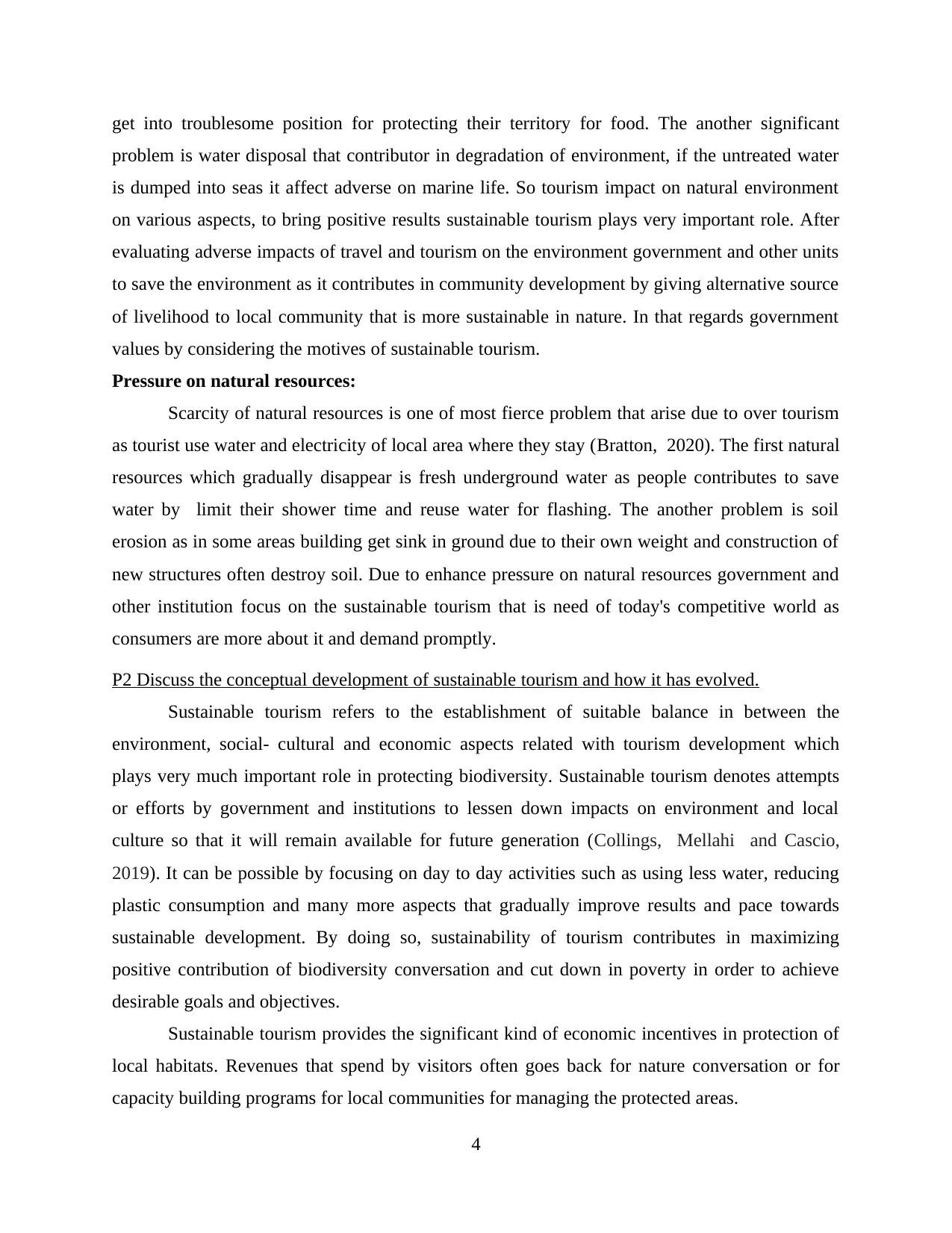
get into troublesome position for protecting their territory for food. The another significant
problem is water disposal that contributor in degradation of environment, if the untreated water
is dumped into seas it affect adverse on marine life. So tourism impact on natural environment
on various aspects, to bring positive results sustainable tourism plays very important role. After
evaluating adverse impacts of travel and tourism on the environment government and other units
to save the environment as it contributes in community development by giving alternative source
of livelihood to local community that is more sustainable in nature. In that regards government
values by considering the motives of sustainable tourism.
Pressure on natural resources:
Scarcity of natural resources is one of most fierce problem that arise due to over tourism
as tourist use water and electricity of local area where they stay (Bratton, 2020). The first natural
resources which gradually disappear is fresh underground water as people contributes to save
water by limit their shower time and reuse water for flashing. The another problem is soil
erosion as in some areas building get sink in ground due to their own weight and construction of
new structures often destroy soil. Due to enhance pressure on natural resources government and
other institution focus on the sustainable tourism that is need of today's competitive world as
consumers are more about it and demand promptly.
P2 Discuss the conceptual development of sustainable tourism and how it has evolved.
Sustainable tourism refers to the establishment of suitable balance in between the
environment, social- cultural and economic aspects related with tourism development which
plays very much important role in protecting biodiversity. Sustainable tourism denotes attempts
or efforts by government and institutions to lessen down impacts on environment and local
culture so that it will remain available for future generation (Collings, Mellahi and Cascio,
2019). It can be possible by focusing on day to day activities such as using less water, reducing
plastic consumption and many more aspects that gradually improve results and pace towards
sustainable development. By doing so, sustainability of tourism contributes in maximizing
positive contribution of biodiversity conversation and cut down in poverty in order to achieve
desirable goals and objectives.
Sustainable tourism provides the significant kind of economic incentives in protection of
local habitats. Revenues that spend by visitors often goes back for nature conversation or for
capacity building programs for local communities for managing the protected areas.
4
problem is water disposal that contributor in degradation of environment, if the untreated water
is dumped into seas it affect adverse on marine life. So tourism impact on natural environment
on various aspects, to bring positive results sustainable tourism plays very important role. After
evaluating adverse impacts of travel and tourism on the environment government and other units
to save the environment as it contributes in community development by giving alternative source
of livelihood to local community that is more sustainable in nature. In that regards government
values by considering the motives of sustainable tourism.
Pressure on natural resources:
Scarcity of natural resources is one of most fierce problem that arise due to over tourism
as tourist use water and electricity of local area where they stay (Bratton, 2020). The first natural
resources which gradually disappear is fresh underground water as people contributes to save
water by limit their shower time and reuse water for flashing. The another problem is soil
erosion as in some areas building get sink in ground due to their own weight and construction of
new structures often destroy soil. Due to enhance pressure on natural resources government and
other institution focus on the sustainable tourism that is need of today's competitive world as
consumers are more about it and demand promptly.
P2 Discuss the conceptual development of sustainable tourism and how it has evolved.
Sustainable tourism refers to the establishment of suitable balance in between the
environment, social- cultural and economic aspects related with tourism development which
plays very much important role in protecting biodiversity. Sustainable tourism denotes attempts
or efforts by government and institutions to lessen down impacts on environment and local
culture so that it will remain available for future generation (Collings, Mellahi and Cascio,
2019). It can be possible by focusing on day to day activities such as using less water, reducing
plastic consumption and many more aspects that gradually improve results and pace towards
sustainable development. By doing so, sustainability of tourism contributes in maximizing
positive contribution of biodiversity conversation and cut down in poverty in order to achieve
desirable goals and objectives.
Sustainable tourism provides the significant kind of economic incentives in protection of
local habitats. Revenues that spend by visitors often goes back for nature conversation or for
capacity building programs for local communities for managing the protected areas.
4
Paraphrase This Document
Need a fresh take? Get an instant paraphrase of this document with our AI Paraphraser
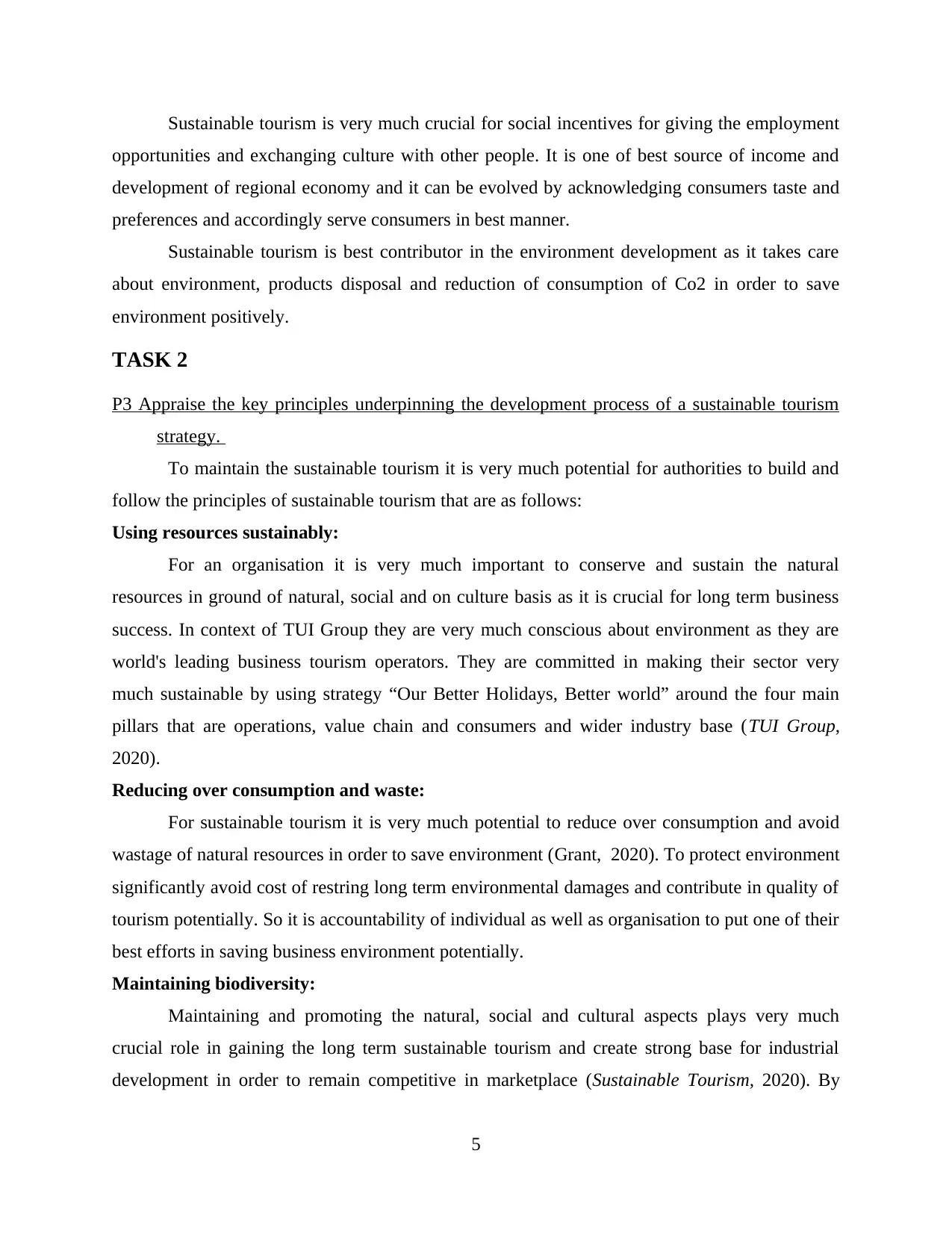
Sustainable tourism is very much crucial for social incentives for giving the employment
opportunities and exchanging culture with other people. It is one of best source of income and
development of regional economy and it can be evolved by acknowledging consumers taste and
preferences and accordingly serve consumers in best manner.
Sustainable tourism is best contributor in the environment development as it takes care
about environment, products disposal and reduction of consumption of Co2 in order to save
environment positively.
TASK 2
P3 Appraise the key principles underpinning the development process of a sustainable tourism
strategy.
To maintain the sustainable tourism it is very much potential for authorities to build and
follow the principles of sustainable tourism that are as follows:
Using resources sustainably:
For an organisation it is very much important to conserve and sustain the natural
resources in ground of natural, social and on culture basis as it is crucial for long term business
success. In context of TUI Group they are very much conscious about environment as they are
world's leading business tourism operators. They are committed in making their sector very
much sustainable by using strategy “Our Better Holidays, Better world” around the four main
pillars that are operations, value chain and consumers and wider industry base (TUI Group,
2020).
Reducing over consumption and waste:
For sustainable tourism it is very much potential to reduce over consumption and avoid
wastage of natural resources in order to save environment (Grant, 2020). To protect environment
significantly avoid cost of restring long term environmental damages and contribute in quality of
tourism potentially. So it is accountability of individual as well as organisation to put one of their
best efforts in saving business environment potentially.
Maintaining biodiversity:
Maintaining and promoting the natural, social and cultural aspects plays very much
crucial role in gaining the long term sustainable tourism and create strong base for industrial
development in order to remain competitive in marketplace (Sustainable Tourism, 2020). By
5
opportunities and exchanging culture with other people. It is one of best source of income and
development of regional economy and it can be evolved by acknowledging consumers taste and
preferences and accordingly serve consumers in best manner.
Sustainable tourism is best contributor in the environment development as it takes care
about environment, products disposal and reduction of consumption of Co2 in order to save
environment positively.
TASK 2
P3 Appraise the key principles underpinning the development process of a sustainable tourism
strategy.
To maintain the sustainable tourism it is very much potential for authorities to build and
follow the principles of sustainable tourism that are as follows:
Using resources sustainably:
For an organisation it is very much important to conserve and sustain the natural
resources in ground of natural, social and on culture basis as it is crucial for long term business
success. In context of TUI Group they are very much conscious about environment as they are
world's leading business tourism operators. They are committed in making their sector very
much sustainable by using strategy “Our Better Holidays, Better world” around the four main
pillars that are operations, value chain and consumers and wider industry base (TUI Group,
2020).
Reducing over consumption and waste:
For sustainable tourism it is very much potential to reduce over consumption and avoid
wastage of natural resources in order to save environment (Grant, 2020). To protect environment
significantly avoid cost of restring long term environmental damages and contribute in quality of
tourism potentially. So it is accountability of individual as well as organisation to put one of their
best efforts in saving business environment potentially.
Maintaining biodiversity:
Maintaining and promoting the natural, social and cultural aspects plays very much
crucial role in gaining the long term sustainable tourism and create strong base for industrial
development in order to remain competitive in marketplace (Sustainable Tourism, 2020). By
5
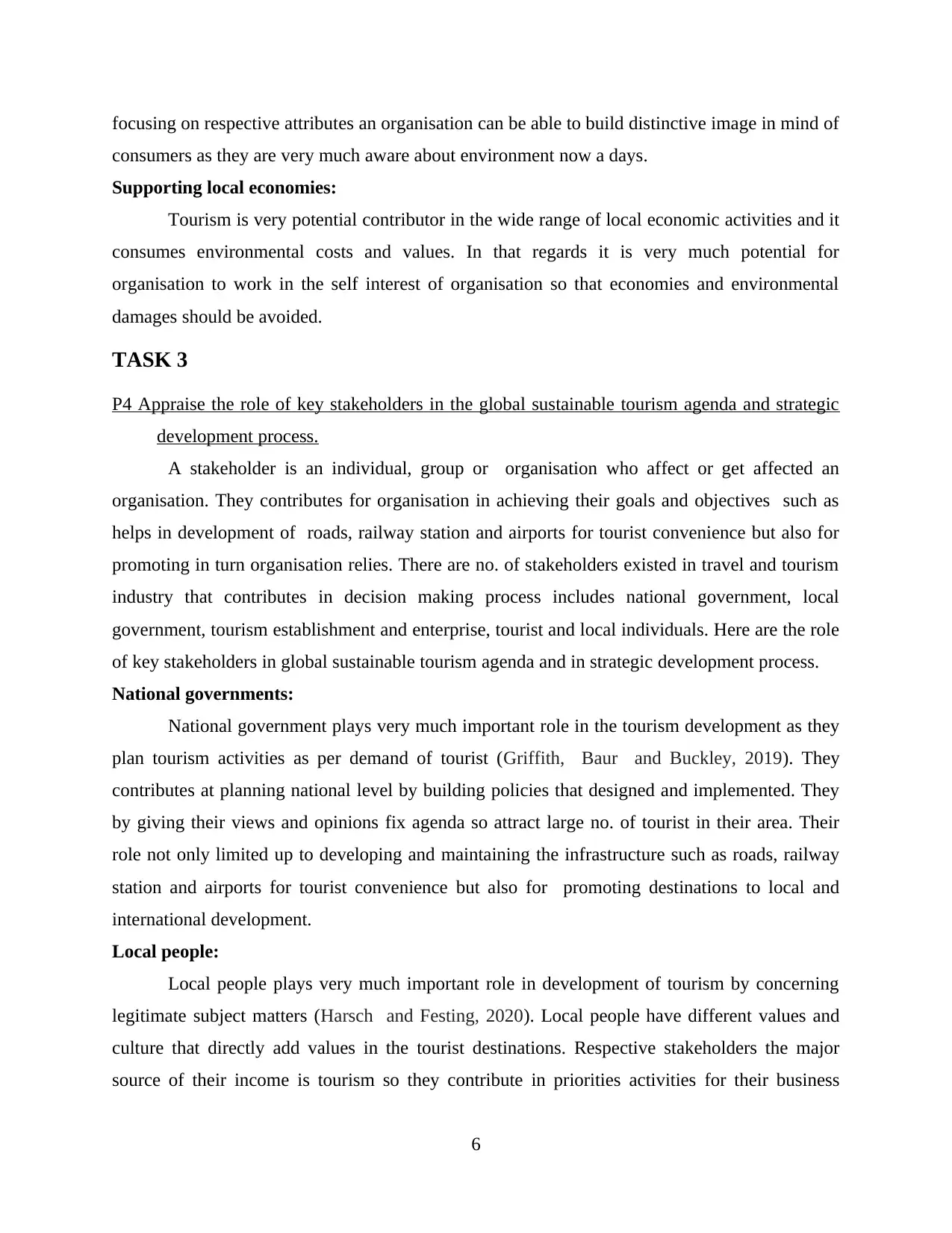
focusing on respective attributes an organisation can be able to build distinctive image in mind of
consumers as they are very much aware about environment now a days.
Supporting local economies:
Tourism is very potential contributor in the wide range of local economic activities and it
consumes environmental costs and values. In that regards it is very much potential for
organisation to work in the self interest of organisation so that economies and environmental
damages should be avoided.
TASK 3
P4 Appraise the role of key stakeholders in the global sustainable tourism agenda and strategic
development process.
A stakeholder is an individual, group or organisation who affect or get affected an
organisation. They contributes for organisation in achieving their goals and objectives such as
helps in development of roads, railway station and airports for tourist convenience but also for
promoting in turn organisation relies. There are no. of stakeholders existed in travel and tourism
industry that contributes in decision making process includes national government, local
government, tourism establishment and enterprise, tourist and local individuals. Here are the role
of key stakeholders in global sustainable tourism agenda and in strategic development process.
National governments:
National government plays very much important role in the tourism development as they
plan tourism activities as per demand of tourist (Griffith, Baur and Buckley, 2019). They
contributes at planning national level by building policies that designed and implemented. They
by giving their views and opinions fix agenda so attract large no. of tourist in their area. Their
role not only limited up to developing and maintaining the infrastructure such as roads, railway
station and airports for tourist convenience but also for promoting destinations to local and
international development.
Local people:
Local people plays very much important role in development of tourism by concerning
legitimate subject matters (Harsch and Festing, 2020). Local people have different values and
culture that directly add values in the tourist destinations. Respective stakeholders the major
source of their income is tourism so they contribute in priorities activities for their business
6
consumers as they are very much aware about environment now a days.
Supporting local economies:
Tourism is very potential contributor in the wide range of local economic activities and it
consumes environmental costs and values. In that regards it is very much potential for
organisation to work in the self interest of organisation so that economies and environmental
damages should be avoided.
TASK 3
P4 Appraise the role of key stakeholders in the global sustainable tourism agenda and strategic
development process.
A stakeholder is an individual, group or organisation who affect or get affected an
organisation. They contributes for organisation in achieving their goals and objectives such as
helps in development of roads, railway station and airports for tourist convenience but also for
promoting in turn organisation relies. There are no. of stakeholders existed in travel and tourism
industry that contributes in decision making process includes national government, local
government, tourism establishment and enterprise, tourist and local individuals. Here are the role
of key stakeholders in global sustainable tourism agenda and in strategic development process.
National governments:
National government plays very much important role in the tourism development as they
plan tourism activities as per demand of tourist (Griffith, Baur and Buckley, 2019). They
contributes at planning national level by building policies that designed and implemented. They
by giving their views and opinions fix agenda so attract large no. of tourist in their area. Their
role not only limited up to developing and maintaining the infrastructure such as roads, railway
station and airports for tourist convenience but also for promoting destinations to local and
international development.
Local people:
Local people plays very much important role in development of tourism by concerning
legitimate subject matters (Harsch and Festing, 2020). Local people have different values and
culture that directly add values in the tourist destinations. Respective stakeholders the major
source of their income is tourism so they contribute in priorities activities for their business
6
⊘ This is a preview!⊘
Do you want full access?
Subscribe today to unlock all pages.

Trusted by 1+ million students worldwide
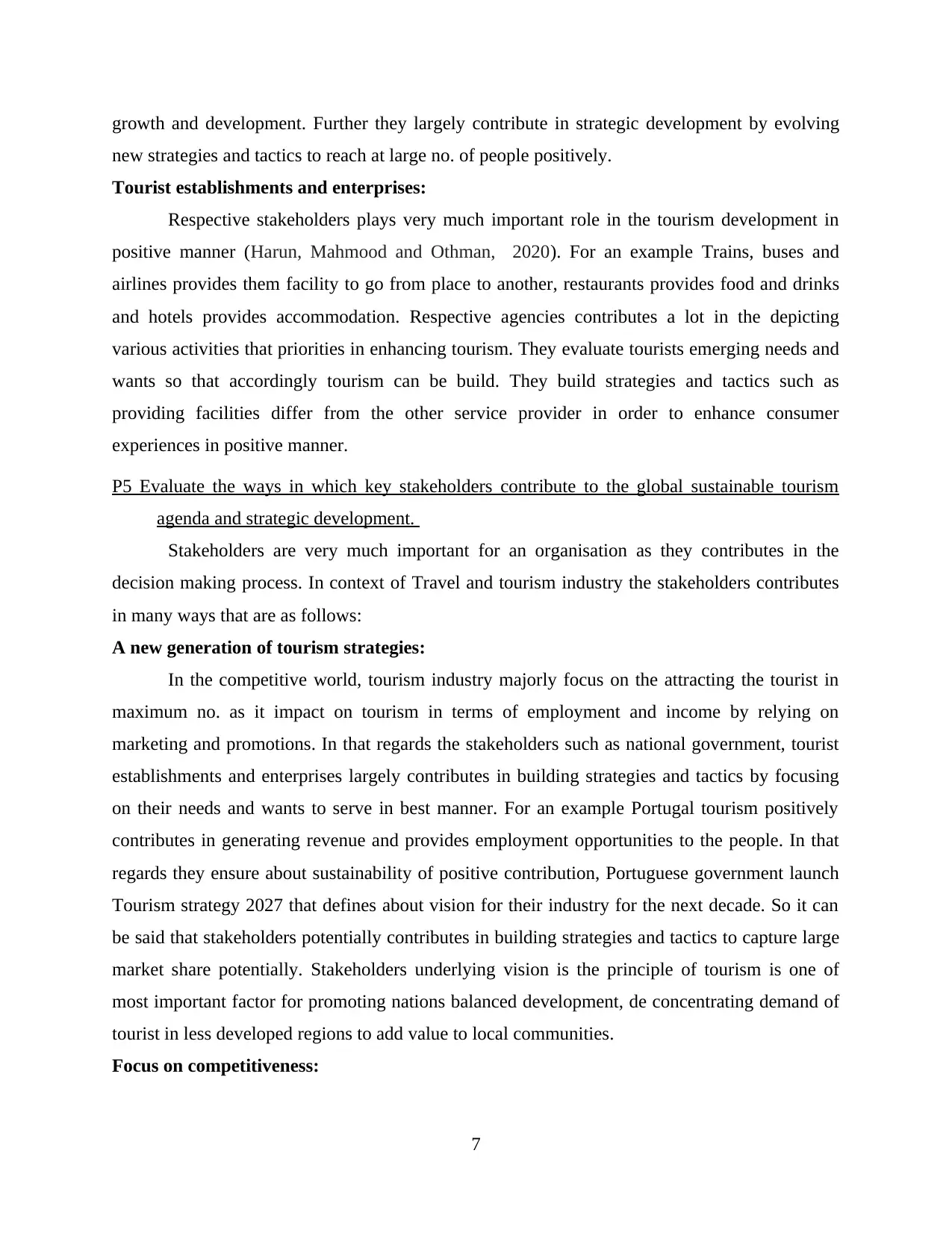
growth and development. Further they largely contribute in strategic development by evolving
new strategies and tactics to reach at large no. of people positively.
Tourist establishments and enterprises:
Respective stakeholders plays very much important role in the tourism development in
positive manner (Harun, Mahmood and Othman, 2020). For an example Trains, buses and
airlines provides them facility to go from place to another, restaurants provides food and drinks
and hotels provides accommodation. Respective agencies contributes a lot in the depicting
various activities that priorities in enhancing tourism. They evaluate tourists emerging needs and
wants so that accordingly tourism can be build. They build strategies and tactics such as
providing facilities differ from the other service provider in order to enhance consumer
experiences in positive manner.
P5 Evaluate the ways in which key stakeholders contribute to the global sustainable tourism
agenda and strategic development.
Stakeholders are very much important for an organisation as they contributes in the
decision making process. In context of Travel and tourism industry the stakeholders contributes
in many ways that are as follows:
A new generation of tourism strategies:
In the competitive world, tourism industry majorly focus on the attracting the tourist in
maximum no. as it impact on tourism in terms of employment and income by relying on
marketing and promotions. In that regards the stakeholders such as national government, tourist
establishments and enterprises largely contributes in building strategies and tactics by focusing
on their needs and wants to serve in best manner. For an example Portugal tourism positively
contributes in generating revenue and provides employment opportunities to the people. In that
regards they ensure about sustainability of positive contribution, Portuguese government launch
Tourism strategy 2027 that defines about vision for their industry for the next decade. So it can
be said that stakeholders potentially contributes in building strategies and tactics to capture large
market share potentially. Stakeholders underlying vision is the principle of tourism is one of
most important factor for promoting nations balanced development, de concentrating demand of
tourist in less developed regions to add value to local communities.
Focus on competitiveness:
7
new strategies and tactics to reach at large no. of people positively.
Tourist establishments and enterprises:
Respective stakeholders plays very much important role in the tourism development in
positive manner (Harun, Mahmood and Othman, 2020). For an example Trains, buses and
airlines provides them facility to go from place to another, restaurants provides food and drinks
and hotels provides accommodation. Respective agencies contributes a lot in the depicting
various activities that priorities in enhancing tourism. They evaluate tourists emerging needs and
wants so that accordingly tourism can be build. They build strategies and tactics such as
providing facilities differ from the other service provider in order to enhance consumer
experiences in positive manner.
P5 Evaluate the ways in which key stakeholders contribute to the global sustainable tourism
agenda and strategic development.
Stakeholders are very much important for an organisation as they contributes in the
decision making process. In context of Travel and tourism industry the stakeholders contributes
in many ways that are as follows:
A new generation of tourism strategies:
In the competitive world, tourism industry majorly focus on the attracting the tourist in
maximum no. as it impact on tourism in terms of employment and income by relying on
marketing and promotions. In that regards the stakeholders such as national government, tourist
establishments and enterprises largely contributes in building strategies and tactics by focusing
on their needs and wants to serve in best manner. For an example Portugal tourism positively
contributes in generating revenue and provides employment opportunities to the people. In that
regards they ensure about sustainability of positive contribution, Portuguese government launch
Tourism strategy 2027 that defines about vision for their industry for the next decade. So it can
be said that stakeholders potentially contributes in building strategies and tactics to capture large
market share potentially. Stakeholders underlying vision is the principle of tourism is one of
most important factor for promoting nations balanced development, de concentrating demand of
tourist in less developed regions to add value to local communities.
Focus on competitiveness:
7
Paraphrase This Document
Need a fresh take? Get an instant paraphrase of this document with our AI Paraphraser
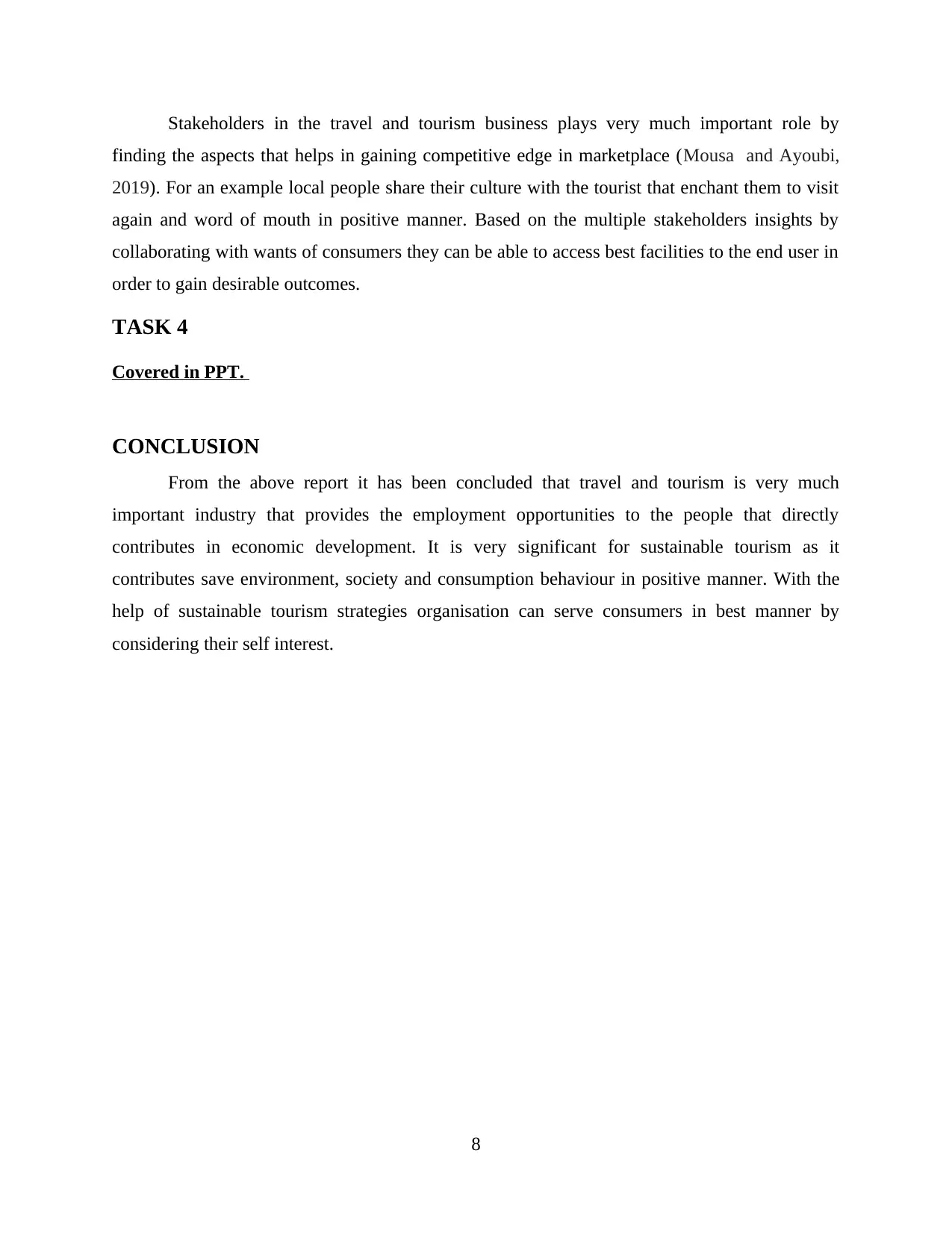
Stakeholders in the travel and tourism business plays very much important role by
finding the aspects that helps in gaining competitive edge in marketplace (Mousa and Ayoubi,
2019). For an example local people share their culture with the tourist that enchant them to visit
again and word of mouth in positive manner. Based on the multiple stakeholders insights by
collaborating with wants of consumers they can be able to access best facilities to the end user in
order to gain desirable outcomes.
TASK 4
Covered in PPT.
CONCLUSION
From the above report it has been concluded that travel and tourism is very much
important industry that provides the employment opportunities to the people that directly
contributes in economic development. It is very significant for sustainable tourism as it
contributes save environment, society and consumption behaviour in positive manner. With the
help of sustainable tourism strategies organisation can serve consumers in best manner by
considering their self interest.
8
finding the aspects that helps in gaining competitive edge in marketplace (Mousa and Ayoubi,
2019). For an example local people share their culture with the tourist that enchant them to visit
again and word of mouth in positive manner. Based on the multiple stakeholders insights by
collaborating with wants of consumers they can be able to access best facilities to the end user in
order to gain desirable outcomes.
TASK 4
Covered in PPT.
CONCLUSION
From the above report it has been concluded that travel and tourism is very much
important industry that provides the employment opportunities to the people that directly
contributes in economic development. It is very significant for sustainable tourism as it
contributes save environment, society and consumption behaviour in positive manner. With the
help of sustainable tourism strategies organisation can serve consumers in best manner by
considering their self interest.
8
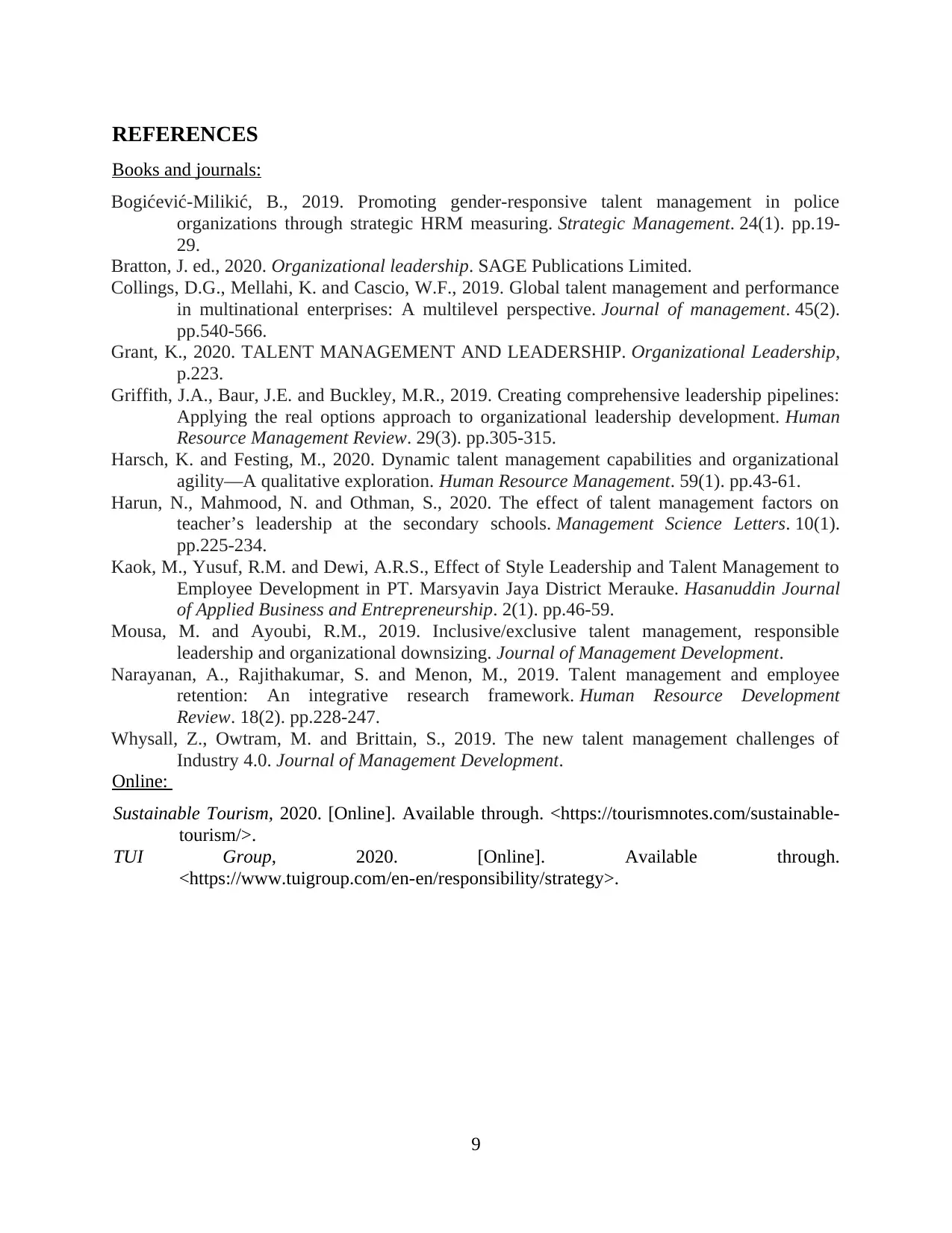
REFERENCES
Books and journals:
Bogićević-Milikić, B., 2019. Promoting gender-responsive talent management in police
organizations through strategic HRM measuring. Strategic Management. 24(1). pp.19-
29.
Bratton, J. ed., 2020. Organizational leadership. SAGE Publications Limited.
Collings, D.G., Mellahi, K. and Cascio, W.F., 2019. Global talent management and performance
in multinational enterprises: A multilevel perspective. Journal of management. 45(2).
pp.540-566.
Grant, K., 2020. TALENT MANAGEMENT AND LEADERSHIP. Organizational Leadership,
p.223.
Griffith, J.A., Baur, J.E. and Buckley, M.R., 2019. Creating comprehensive leadership pipelines:
Applying the real options approach to organizational leadership development. Human
Resource Management Review. 29(3). pp.305-315.
Harsch, K. and Festing, M., 2020. Dynamic talent management capabilities and organizational
agility—A qualitative exploration. Human Resource Management. 59(1). pp.43-61.
Harun, N., Mahmood, N. and Othman, S., 2020. The effect of talent management factors on
teacher’s leadership at the secondary schools. Management Science Letters. 10(1).
pp.225-234.
Kaok, M., Yusuf, R.M. and Dewi, A.R.S., Effect of Style Leadership and Talent Management to
Employee Development in PT. Marsyavin Jaya District Merauke. Hasanuddin Journal
of Applied Business and Entrepreneurship. 2(1). pp.46-59.
Mousa, M. and Ayoubi, R.M., 2019. Inclusive/exclusive talent management, responsible
leadership and organizational downsizing. Journal of Management Development.
Narayanan, A., Rajithakumar, S. and Menon, M., 2019. Talent management and employee
retention: An integrative research framework. Human Resource Development
Review. 18(2). pp.228-247.
Whysall, Z., Owtram, M. and Brittain, S., 2019. The new talent management challenges of
Industry 4.0. Journal of Management Development.
Online:
Sustainable Tourism, 2020. [Online]. Available through. <https://tourismnotes.com/sustainable-
tourism/>.
TUI Group, 2020. [Online]. Available through.
<https://www.tuigroup.com/en-en/responsibility/strategy>.
9
Books and journals:
Bogićević-Milikić, B., 2019. Promoting gender-responsive talent management in police
organizations through strategic HRM measuring. Strategic Management. 24(1). pp.19-
29.
Bratton, J. ed., 2020. Organizational leadership. SAGE Publications Limited.
Collings, D.G., Mellahi, K. and Cascio, W.F., 2019. Global talent management and performance
in multinational enterprises: A multilevel perspective. Journal of management. 45(2).
pp.540-566.
Grant, K., 2020. TALENT MANAGEMENT AND LEADERSHIP. Organizational Leadership,
p.223.
Griffith, J.A., Baur, J.E. and Buckley, M.R., 2019. Creating comprehensive leadership pipelines:
Applying the real options approach to organizational leadership development. Human
Resource Management Review. 29(3). pp.305-315.
Harsch, K. and Festing, M., 2020. Dynamic talent management capabilities and organizational
agility—A qualitative exploration. Human Resource Management. 59(1). pp.43-61.
Harun, N., Mahmood, N. and Othman, S., 2020. The effect of talent management factors on
teacher’s leadership at the secondary schools. Management Science Letters. 10(1).
pp.225-234.
Kaok, M., Yusuf, R.M. and Dewi, A.R.S., Effect of Style Leadership and Talent Management to
Employee Development in PT. Marsyavin Jaya District Merauke. Hasanuddin Journal
of Applied Business and Entrepreneurship. 2(1). pp.46-59.
Mousa, M. and Ayoubi, R.M., 2019. Inclusive/exclusive talent management, responsible
leadership and organizational downsizing. Journal of Management Development.
Narayanan, A., Rajithakumar, S. and Menon, M., 2019. Talent management and employee
retention: An integrative research framework. Human Resource Development
Review. 18(2). pp.228-247.
Whysall, Z., Owtram, M. and Brittain, S., 2019. The new talent management challenges of
Industry 4.0. Journal of Management Development.
Online:
Sustainable Tourism, 2020. [Online]. Available through. <https://tourismnotes.com/sustainable-
tourism/>.
TUI Group, 2020. [Online]. Available through.
<https://www.tuigroup.com/en-en/responsibility/strategy>.
9
⊘ This is a preview!⊘
Do you want full access?
Subscribe today to unlock all pages.

Trusted by 1+ million students worldwide
1 out of 9
Related Documents
Your All-in-One AI-Powered Toolkit for Academic Success.
+13062052269
info@desklib.com
Available 24*7 on WhatsApp / Email
![[object Object]](/_next/static/media/star-bottom.7253800d.svg)
Unlock your academic potential
Copyright © 2020–2026 A2Z Services. All Rights Reserved. Developed and managed by ZUCOL.





